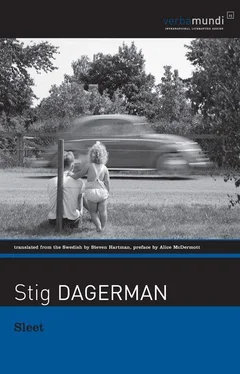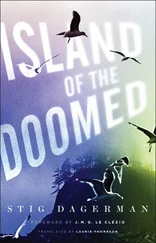By the time he begins his third round of the day, every building he comes to is empty and silent. The stairwells smell of dust and desolation. The shops are all closed, and his clacking footsteps echo over every cobblestone courtyard. The Church of Catherine’s tolling bell chases him every fifteen minutes, hastening him on from doorway to doorway. On each and every mail carrier’s route the tolling bells of some church lash out like a long, harsh whip. The air is now stifling, and there are no shadows on the streets. The weak blue smoke of afternoon hangs over every courtyard. All those who have gone away for the holiday have drawn their blinds, and so all the buildings seem to be in mourning.
When he comes home again, his father is gone. In the big room with the full-length mirror on the doors, his mother sits in front of the clothespress, teasing out her hair. Under her stool is a wadded-up handkerchief. She has been crying. Håkan goes into his room.
He lies on his bed and leafs through his English grammar textbook as far as Should/Would . Then his mother comes in and sits at the foot of the bed, letting the silence between them grow warm before she says anything. The sounds of the city meanwhile needle their way into the room: a steamboat in the harbor sounding a loud whistle, thick with anxiety; a window slamming shut with a bang, panes a-rattle; an ambulance with its morbid music approaching and then disappearing again slowly, leaving behind a trail of disquiet. His mother grabs hold of his ankles with a sudden force that is still somehow feeble.
“You really should go outside,” she whispers. “Go out and have some fun. It’s Midsummer’s Eve. You can’t stay inside on Midsummer’s Eve. I won’t let you.”
The Church of Catherine’s bell sounds a single tone, soft like a piano note. Håkan closes his eyes but says nothing. She leaves him alone. After a little while he hears his father come home, hears his steps faltering as he bumps into things in the kitchen, first opening and then closing cupboard doors, then knocking chairs into one another. Full of regrets he has probably brought home flowers, tulips most likely. As he lumbers back and forth in the large room, Håkan’s mother is silent. After a good while, it seems they have become friends. Words are exchanged in muted tones. His father’s steps now creak in the corridor, approaching Håkan’s door. When he knocks Håkan scrambles out of bed and moves to the window. His father enters the room and approaches Håkan from behind, excruciatingly slow. Then comes the arm hooked round the neck, the murderously suffocating embrace.
“You can’t sit here at home, boy,” he says. “Not on Midsummer’s Eve.”
The father lifts up Håkan’s face, holding it in his hands like a stone.
“OK,” the boy says. “I’ll leave.”
“Take my bike,” the father says to the stone. “It’s out on the street.”
And so he takes the bike and rides down Katarinavägen. It’s an old bike, with fenders that rattle. The city is quiet. The only noise seems to come from his own clattering fenders. Through the thin blue haze of ferry smoke and dusk he can make out the light-spangled serpent of the amusement park across the water, writhing about in powerless despair. He rides around the wide and meandering harbor shore and then casts himself in among the lights and sounds of the bustling crowds with his fenders clattering. Like a leper, he thinks, since he has read somewhere how lepers fasten warning bells to their clothes. On the winding, shadow-soaked roads of Djurgården he startles a hare and more than one amorous couple. No one else is riding a bike. In all of creation’s vast expanse, he is the only one journeying forth on a bicycle. If I wasn’t on this bike , he thinks, I wouldn’t be so alone .
At a clearing along the shore, he lays the bike down on the ground. It is late now but still very light out. Empty white boats glide past with gulls trailing in their smoky plumes. He sits and follows their course with his eyes until they disappear in the dusk with their stern flags drooping. One of them blows its horn as a warning to the Tegelvik ferry, as if crossly scolding a dog. Everywhere he turns the evening is alive with music. Small campfires flicker on nearby islands and distant bluffs, with fires that leap out suddenly and stretch their flaming tongues over the water. From the dark gap where the mouth of Hammarby Canal meets the harbor, a white sail glides out toward him like a letter through a mail slot. In long silhouettes the cranes at the Stockholm shipyards stand out in rows against the skyline like lizards, their heads bent sharply forward as if preparing to drink from the water. Higher in the sky, more or less directly over his territory, hover clouds blackened as if gutted by fire yet radiant around their edges. He has read a book recently in which clouds of this sort were called “sleeping wrecks.” In an apartment deep below these clouds his father has just fallen asleep with his mouth open, hands folded against his chest. And at an open window stands his mother, combing her black hair before bed.
One day a palm tree will arrive from Africa for the specialty lumber dealer on Kocksgatan. It will be hard to get it around that tight corner there at the intersection of Östgötagatan, but in the end he knows that they’ll manage it nevertheless.
In time he begins to feel the evening chill, and so he takes up his father’s bike and rides again, clattering through the twilit night, off toward the sleeping wrecks.
He knows precious little about life, the boy who mans the ferry newsstand, this fifteen-year-old who becomes so tongue-tied and ashamed one Sunday when he is startled by the cook’s husband up above the dock. The boy is loitering on the exposed rock between some bushes, poking and jabbing in through the branches with a sharp piece of board he found down near the shoreline. Who knows what rogues might be lurking behind them? And what better way to rout them out? But when the cook’s husband appears out of nowhere, the boy stammers something about there being wasps’ nests in those bushes, maybe even rats, then he gathers up his dignity and heads off to the other side of the cove, beyond the sunken barge, to lay in the sun on a shelf of high exposed rock. Nearby a dirty little canal wide enough for a rowboat flows out under an overhanging thicket, extending a small gray finger into the clear water. This is the very spot where he asked Barbro, the kitchen helper, if she’d like to play Adam and Eve one evening when they went for a swim. When she replied, “You show me yours and I’ll show you mine,” he lost his nerve and wished he’d never said it.
It turns out that there’s a good deal he desires but cannot find the nerve to do this summer. The little notebook he always carries in his pocket is littered with scribblings of those desires: he feels like a string that has yet to be played, a taut string fearful of being plucked lest it should break, or like a dynamo spinning and spinning without any outcome.
Now he lies here on the rock shelf in the broiling sun, drawing a small sailboat as it tacks in the sound. His boat isn’t bad, but he can’t say as much for his attempts to catch the water’s reflections shimmering in the midday heat or the flock of gulls that dive continuously into a yellow slick of something a couple sailors have poured out over a gunwale. On another island, just across the sound, two girls in red bathing suits are moving along the shore with small, timid steps, as music plays above them from a gramophone atop a rock cliff. Maybe they are afraid of snakes, which is enough to make anyone’s bare feet dart anxiously from toe to toe as they eye the grass before them. In boots you’re apt to take fearful lumbering steps as you whistle up into the empty air with a bit too much gusto. The strides of fear come in all walks, sure enough.
Читать дальше












